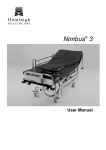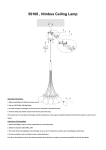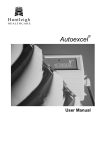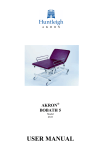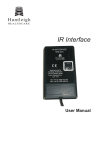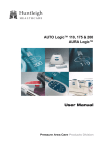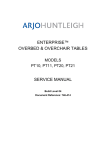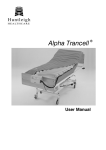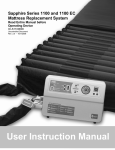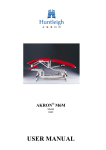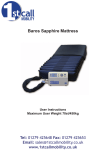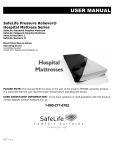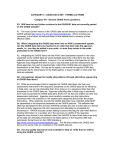Download L:\Publications\User Manuals\P A C\Nimbus 2\152997EN_01.vp
Transcript
Huntleigh H E A LT H C A R E Nimbus II ® User Manual CONTENTS Introduction . . . . . . . . . . . . . . . . . . . . . . . . . . . . . . . . . . . . . 1 About This Manual . . . . . . . . . . . . . . . . . . . . . . . . . . . . . . . 1 About Nimbus II . . . . . . . . . . . . . . . . . . . . . . . . . . . . . . . . . 2 Clinical Applications Indications. . . . Contraindications Patient Transport Patient In Chair . . . . . . . . . . . . . . . . . . . . . . . . . . . . . . . . . . . . . . . . . . . . . . . . . . . . . . . . . . . . . . . . . . . . . . . . . . . . . . . . . . . . . . . . . . . . . . . . . . . . . . . . . . . . . . . . . . . . . . . . . . . . . . . . . . . . . . . . . . . . . . . . . . . . . . . . . . . . . . . . . 3 3 3 3 3 Product Description . Mattress . . . . . Pump . . . . . . Bed Bracket . . . Tube-Set . . . . . . . . . . . . . . . . . . . . . . . . . . . . . . . . . . . . . . . . . . . . . . . . . . . . . . . . . . . . . . . . . . . . . . . . . . . . . . . . . . . . . . . . . . . . . . . . . . . . . . . . . . . . . . . . . . . . . . . . . . . . . . . . . . . . . . . . . . . . . . . . . . . . . . . . . . . . . . . . . . . . 4 4 5 6 6 Installation . . . . . . . . . . . . . . . . . . . . . . . . . . . . . . . . . . . . . . 7 Preparing the Mattress and Pump . . . . . . . . . . . . . . . . . . . . . . . 7 Inflating The Mattress . . . . . . . . . . . . . . . . . . . . . . . . . . . . . 11 Testing The Power Fail Alarm . . . . . . . . . . . . . . . . . . . . . . . . . 11 Operation . . . . . . . . . . . . . . . . . . . . . System Optimisation . . . . . . . . . . . . . Selecting Mode Of Operation . . . . . . . . Silencing Audible Alarms . . . . . . . . . . Comfort Control . . . . . . . . . . . . . . . Transport Control . . . . . . . . . . . . . . CPR Control . . . . . . . . . . . . . . . . . Controls, Indicators And Alarms - Pump Unit . . . . . . . . . . . . . . . . . . . . . . . . . . . . . . . . . . . . . . . . . . . . . . . . . . . . . . . . . . . . . . . . . . . . . . . . . . . . . . . . . . . . . . . . . . . . . . . . . . . . . . . . . . . . . . . . . . . . . . . . . . . . . . . . . . . . . . . . 13 13 13 14 14 14 15 16 Cleaning . . . . . . . . . . . During Use . . . . . . . . Laundering . . . . . . . . Mattress Cover. . . . . . Foam Layer . . . . . . . Mattress Base And Cells. Nimbus II Pump . . . . . . . . . . . . . . . . . . . . . . . . . . . . . . . . . . . . . . . . . . . . . . . . . . . . . . . . . . . . . . . . . . . . . . . . . . . . . . . . . . . . . . . . . . . . . . . . . . . . . . . . . . . . . . . . . . . . . . . . . . . . 20 20 20 20 21 21 22 . . . . . . . . . . . . . . . . . . . . . . . . . . . . . . . . . . . . . . . . . . . . . . . . . . . . . . . . . . . . . . . . . . . . . . Troubleshooting . . . . . . . . . . . . . . . . . . . . . . . . . . . . . . . . . . 23 Fuse Replacement. . . . . . . . . . . . . . . . . . . . . . . . . . . . . . . 24 Warranty And Service . . . . . . . . . . . . . . . . . . . . . . . . . . . . . . . 25 Routine Checks . . . . . . . . . . . . . . . . . . . . . . . . . . . . . . . . . . 26 Mattress . . . . . . . . . . . . . . . . . . . . . . . . . . . . . . . . . . . . 26 Pump. . . . . . . . . . . . . . . . . . . . . . . . . . . . . . . . . . . . . . 26 Technical Description . . . . . . . . . . . . . . . . . . . . . . . . . . . . . . . 27 (i) Safety Before you connect the system pump to a mains socket, read carefully all the installation instructions in Section 4 – Installation. The system has been designed to comply with regulatory safety standards including: • EN 60601-1 For your own safety and the safety of the equipment always take the following precautions: • Keep the pump away from sources of liquids • Do not expose the system, especially the mattress, to naked flames, such as cigarettes etc. • Do not store the system in direct sunlight • Do not use hypercarbonate and phenolic based cleaning solutions • Keep sharp objects away from the mattress • Ensure that the system is clean and dry prior to storage • Store the pump and mattress in the protective bags supplied • We recommend the use of cot sides on the bed while the system is in use and the patient is positioned on top. Local policies regarding the use of cot sides should be taken into account. • Keep these instructions handy for reference (ii) SAFETY WARNING The cover of this product is vapour permeable but not air permeable and may present a suffocation risk. It is the responsibility of the care giver to ensure that the user can use this product safely. WARNINGS Electrical equipment may be hazardous if misused. The pump’s case back should only be removed by authorised technical personnel. Do not use the Nimbus II pump in the presence of flammable gases such as anaesthetic agents. Caution Handles are provided for lifting the mattress complete with patient from the bed frame. The drag handles are provided ONLY for transporting the mattress and patient across flat surfaces in an emergency and should NOT be used for any other purpose. (iii) (iv) 1. Introduction About This Manual This manual is your introduction to the Nimbus® II system. Use it to initially set up the mattress replacement system, keep it as a reference for day-to-day routines and as a guide to maintenance. Section 2 Clinical Applications: gives examples of Section 3 Product Description: a technical description of the system. Section 4 Installation: explains how to install and set up the Nimbus II system. Section 5 Operation: a reference guide for Section 6 Cleaning: routine cleaning in use and Section 7 Troubleshooting: routine maintenance the type of patients that could benefit from this system and illustrates a method of assessing them. day-to-day operation and contains important information on what to do if the patient suffers a cardiac arrest. recommended laundering procedures. procedures and solutions for minor problems that may occur. Section 8 Warranty and Service: details the warranty and what to do if the equipment requires servicing or repair. Section 9 Routine Checks: details periodic inspections of the pump and mattress. Section 10 Technical Description: a list of technical data. 1 About Nimbus II Nimbus® II is a Dynamic Flotation System for the prevention, treatment and management of pressure sores. It employs a revolutionary cell design to realise interface pressures below 20 mmHg for over 65% of the cycle. The Nimbus II system incorporates a unique sensor pad, known as Auto-Matt®, which ensures that the patient is automatically supported at optimum pressures regardless of size, height, position or weight distribution. The Nimbus II mattress is designed for use with standard hospital beds as well as in the home. Users are able to employ established practices for lifting, turning and moving patients. Beds can also be adjusted or gatched in the normal way without impairing the mattress pressure relieving performance. A water resistant, vapour permeable cover is supplied that enhances patient comfort whilst protecting the mattress interior from contamination. It is simple to clean in situ but can also be quickly unzipped and totally removed for laundering, gas sterilisation or autoclaving. If cardiac arrest occurs the mattress can be deflated in less than 10 seconds to allow cardiac resuscitation procedures to be performed. The pump provides two modes of operation: l l A dynamic mode that cycles the support surface beneath the patient every 10 minutes providing periods of pressure relief for the whole body A static mode where the support surface remains constant (all cells equally inflated) 2 2. Clinical Applications The Nimbus II system, with its ability to provide reduced interface pressures in both dynamic and static operating modes, is used to treat those patients who are at very high risk of developing or who have pressure ulcers. A risk assessment tool combined with clinical judgement should be used when determining a patient’s level of risk of developing pressure ulcers. Patient risk assessment should be an ongoing process as changes in the patient’s condition may increase or decrease their risk level. Indications The Nimbus II system is appropriate for patients assessed to be at very high risk of developing pressure ulcers, and for all grades of pressure ulcer up to and including grade 4 (NPUAP, 1989)1. The Nimbus II system should be used in dynamic mode whenever possible as this will continuously change the tissue pressure points, providing the highest degree of pressure relief. Nimbus II in static mode provides a stable surface for nursing procedures and for patients with spinal alignment problems. Both modes of operation are appropriate for use for patients weighing between 45-250 kg (100-550 lb). Contraindications The Nimbus II system should not be used for patients with unstable spinal fractures. In the case of patients with other unstable fractures, where a moving surface could be harmful, advice should be obtained from the appropriate physician before using the Nimbus II system. Patient Transport Patients should be transported on the Nimbus II system whenever they leave the nursing unit. Refer to the section in this manual dealing with operation of the transport function. Patient In Chair If the patient will be sitting in a chair for any period of time, it is strongly recommended that a pressure reducing or relieving seat cushion is used. + The Nimbus II system is an aid to the prevention and management of pressure ulcers. If there is no improvement in the patient’s condition, specialist advice should be sought. The above are guidelines only and should not replace clinical judgement or experience 1 National Pressure Ulcer Advisory Panel (1989). Clinical Practice Guideline, Number 3, AHCPR, US Department of Health & Human Services, 1992. 3 3. Product Description Mattress The Nimbus II mattress is constructed from several materials and composites, most of which contain polyurethane (P.U.). This material is noted for its excellent durability coupled with good flexibility. This flexibility does not significantly alter in long term use and thus mattress components do not suffer the effects of ‘age hardening’. The mattress is totally enclosed in a carefully designed double zipped cover. The top and sides of the cover are constructed from a two-way super stretch and moisture proof material which is vapour permeable for maximum patient comfort. The base of the cover is constructed from a tough abrasion resistant material and is fitted with bed attachment straps, sheet clips lifting and drag handles. Patient support is provided by cells that are grouped in three sections, each of which has a specific function. The head cells remain at a constant pressure for pillow stability and patient comfort. The torso area is served by special cell assemblies that combine alternating and static pressure characteristics to support patients fully in both lying and sitting positions without the risk of ‘bottoming’. The thigh to foot section of the mattress has cells that dynamically cycle to maximise pressure relief. A CPR (Cardio-Pulmonary Resuscitation) control is positioned at the foot end of the mattress to allow the air to be evacuated in under 10 seconds should a cardiac arrest occur. Transport Control FAST DEFLATE NORMAL CP R 1 2 3 4 TRANSPORT Tube Set Connector Port Situated next to the CPR control is the Transport control. This allows cross connection of the cell structure creating an even pressure in all the cells. The transport control also seals the mattress so that air is not exhausted when the tube-set is disconnected. This feature is extremely useful for transporting the patient between wards, to operating rooms and X-ray departments without removing the patient from the bed. A further application of the transport feature is that, during a power failure, prompt operation of the transport control will seal the mattress and maintain support for at least 12 hours. The mattress has been designed for ease of maintenance. The top cover can be removed and replaced with the patient in situ so that it can be laundered. All mattress components can be easily changed if damage occurs, either as unit parts or assemblies. Pump À Á Æ À Á Â Ã Ã Â Ä Å Ç ADVANCED DYNAMIC FLOTATION SYSTEM Ä Å Æ Ç Power (and Alarm reset) switch Static/Dynamic push button Mute push button Alarm symbol 5 Alarm messages Comfort control Mains input connector Tube set connector The pump comprises a rugged moulded case with non slip feet on the base and rear and an integral carry handle. The unit has been designed to maintain sustained operation and to withstand prolonged use in the hospital environment . The controls and indicators are located on the front panel which is recessed to prevent accidental operation. The pump incorporates a sophisticated alarm system which differentiates between normal operation and genuine system faults. If an alarm situation is detected a flashing indicator will illuminate together with an indication of the cause of alarm and an audible warning will sound. Bed Bracket The pump can be fixed to the foot end of a hospital bed by the separate bed bracket which has been designed for simplicity and ease of use. It features a simple self adjusting mechanism that clips onto most common bed frames (18-50mm wide) and a hook that fits into the pump handle. Once installed, the pump is resistant to being accidentally dislodged from the end of the bed. The pump can also be stood on the floor, either vertically or horizontally. Tube-Set The tube-set incorporates a flexible, compact anti-kink tube that is resistant to crushing and any subsequent obstruction of air flow. Each end has a quick lock system for easily connecting and disconnecting the air supply at the pump and mattress. 6 4. Installation These instructions cover initial set up and operation of the Nimbus II system. More detailed information regarding controls, alarms and indicators can be found in Section 5. Preparing the Mattress and Pump 1. Remove mattress, pump and tube set from the packaging. You should have the following items: l l l l l mattress assembly including the Soiled/Available For Use label pump power cord bed bracket tube-set 2. Store the pump box and carry bag in a safe place for future use. 3. Remove the conventional mattress from the bed frame and check that there are no protruding springs or sharp objects on the bed base. + Heavily ridged bed baseboards may require special considerations for correct system operation – consult your Huntleigh Healthcare service engineer. 4. Unroll the mattress onto the bed base from the head end ensuring that the CPR swing label is hanging freely. 5. Attach the mattress to the bed frame using the hook and loop fastener straps. 7 + If the bed is to be gatched, attach the mattress to the movable part of the bed only. 6. Unzip the mattress cover to locate the Auto-Matt sensor pad which is situated under the cells between the soft and compressed base foam. Ensure that the Auto-Matt pad is lying flat and not kinked. Leave the mattress cover end free when gatching the bed. Cover FA ST C P R DEF LA TE NO RM TR Air Cells AL AN SIT Foam Layer Auto-Matt Pad 6 4 7. Zip up the mattress taking care not to trap any cell material in the zip. 8 8. Check that the transport control is set to NORMAL and that the CPR control is fitted and locked in position. FAST DEFLATE NORMAL CP R 1 TRANSPORT 2 3 9. If the pump is to be hung from the end of the bed, attach the bed bracket to the bed frame and attach the pump to the bracket. Old New Alternatively the pump can be placed underneath the bed, either upright or lying on its back. 9 10. Connect the tube-set to the mattress and pump, ensure both connections are secure. 11. Insert the mains connector into the socket on the side of the pump and connect to a suitable mains power outlet. 10 Inflating The Mattress 1. Switch the pump On/Off switch to ON: the ON light on the front panel should illuminate. 2. The pump will now run a self test for approximately 3 seconds when all indicators will be illuminated. 3. If the pump detects low pressure it will enter an inflation sequence with the LOW PRESSURE and WAIT messages illuminated. Once normal operating pressure has been reached both the LOW PRESSURE and WAIT lights will switch off. It may take 15 minutes to inflate the mattress. Testing The Power Fail Alarm The power fail alarm is powered by a rechargeable battery. The duration of the alarm will depend on the level of charge in the battery. In use, it may have become discharged or reached the end of its life. It is therefore recommended that the alarm be tested before use. 1. Connect the pump to the mains, switch on and allow to run for 10-15 seconds. 2. Remove the mains power at the wall socket without switching the pump off. 3. The alarm should operate within 10 seconds. Caution If the power fail alarm does not operate after this test, only use the pump under supervision to ensure that the power-on status is checked at regular intervals. 4. If the alarm does not operate, run the pump for 4 hours to recharge the battery. 5. Retest the alarm after at least 4 hours. Allow the alarm to operate for 2 minutes to ensure that it has been adequately recharged. 6. If the alarm does not operate for 2 minutes, call the service engineer. 11 Continue to use the pump only under supervision to ensure that the power-on status is checked at regular intervals. All other alarms will continue to function as normal. + When rolling up the mattress after a period of use, always roll from the foot end. Complete and return the Guarantee Registration Card. 12 5. Operation These instructions cover day-to-day operation of the system. Other operations, such as maintenance and repair, should only be carried out by suitably qualified personnel. System Optimisation The Nimbus II system automatically compensates for patient weight distribution and position optimising the pressure relieving performance. To ensure that the pressure relieving properties are not impaired, the cover must not be pulled tight and covering sheets should fit loosely using the attached clips. The system provides two modes of operation: Static and Dynamic. Dynamic provides the optimum pressure relieving performance and should be used in most cases. Static mode provides a stable, non-moving support surface for instances where a dynamic support surface is contra-indicated. Selecting Mode Of Operation + In Dynamic mode the support surface beneath the patient is cycled every 10 minutes. In Static mode the support surface remains constant (all cells equally inflated). When Static mode is selected an indicator on the static push button illuminates. Both modes of operation are selected by this push button. The pump defaults to Dynamic mode of operation when switched on at the pump. To change mode of operation: 1. Press the static push button once. An audible tone will sound and a visual indicator on the push button will illuminate to show that the system is in static mode 2. To select Dynamic mode from Static mode press the static push button once. An audible tone will sound and the visual indicator will switch off 13 Silencing Audible Alarms + In its normal operating mode an audible alarm can only be silenced after an alarm has occurred. An internal setting can be used to change the mode of operation so that this button can pre-silence an alarm. Call your service engineer if this option is required. Comfort Control + Audible alarms can be silenced using the mute push button. To silence an alarm simply push the mute button once (the mute light will remain on). Mattress cell pressure can be manually adjusted for patient comfort using the rotary comfort control. Turn clockwise for a firmer setting and anti-clockwise for a softer setting – the mattress minimum pressure is maintained at the chosen level. The system automatically compensates for patient size, height, position and weight distribution to provide optimum support regardless of comfort control setting. Transport Control This seals the mattress and allows removal of the pump for patient transport. The patient will remain supported by the mattress for at least 12 hours in transport mode. 1. At the foot end of the mattress turn the transport control knob clockwise to TRANSPORT. 2. Turn the pump off and disconnect the tube-set. + If the transport control is set to TRANSPORT with the tubeset connected and pump on, then the pump will indicate a low pressure fault alarm. To resume normal operation simply re-connect the pump and turn the transport control knob anti-clockwise to NORMAL. 14 CPR Control IMPORTANT IN THE EVENT OF CARDIAC ARREST. In the event of a patient suffering cardiac arrest: 1. Lift red handle on control panel at foot end of mattress. 2. Turn handle anti-clockwise. 3. Pull handle away from panel. 15 4. The triangular seal will rotate and air exhaust from the mattress. The torso area of the patient will bottom out in less than 10 seconds. FAST DEFLATE NORMAL CP R 1 TRANSPORT 2 3 To Re-set 1. Turn grey triangular seal clockwise and push onto connectors 2. Turn red handle clockwise 3. Fold handle flat to lock in position Controls, Indicators And Alarms - Pump Unit Controls On/Off Switch (And Alarm Reset) Switches the mains power on and off. It is combined with an internal battery circuit that will activate the alarm system if the power supply is interrupted prior to switching off. Examples are mains lead removal, mains power failure. O I Static Selects operating mode, switches between either Static or Dynamic mode. Static mode is confirmed when the yellow indicator on the push button is illuminated. When Dynamic mode (default) is selected the yellow indicator will be extinguished. Mute An audible alarm mute is provided to cancel warning sounds during an alarm condition. 16 Comfort Control soft firm Indicators ‘WAIT This is a rotary action control to set the relative firmness/softness of the mattress for patient comfort. Visible and audible indicators are provided as described below. If the pump detects a low pressure in the mattress at switch on, the WAIT indicator is illuminated and the pump performs a start up procedure to inflate the mattress quickly. Once correct operating pressures have been reached the WAIT indicator is switched off. This may take up to 15 minutes. static The indicator on the static push button is illuminated when Static mode has been selected for operation. mute The indicator on the mute push button is illuminated when the audible alarm has been silenced. HIGH PRESSURE LOW PRESSURE The HIGH PRESSURE indicator is illuminated whenever the pump detects a high pressure within the mattress. If this condition occurs the air supply from the pump is switched off until normal pressure is detected. After 2 seconds of normal pressure being detected the indicator is switched off and the air supply restarted. The LOW PRESSURE indicator is illuminated whenever the pump detects a low pressure within the mattress. This may indicate that there is insufficient pressure to support a patient or that the Transport control is turned to the TRANSPORT position whilst the pump is on and connected to the mattress. This indicator will be switched off once normal pressure is reached. 17 U.K. Only POWER + Alarms Flashing POWER light indicates power has been interrupted. Steady POWER light indicates power has been interrupted but has been restored. This may only be cancelled by turning the On/Off switch off and on again. The pump unit incorporates a sophisticated alarm detection system that differentiates between patient movement and genuine alarm conditions. Whenever an alarm occurs a flashing red triangle becomes active together with an indicator of the cause of the alarm. Additionally, an audible warning will sound unless cancelled by the Mute button as described earlier. The triangular alarm symbol is displayed with one or more of the following visual indicators: l LOW PRESSURE l HIGH PRESSURE l PUMP FAULT l POWER (indicating a power failure) If any of these alarm conditions is raised the alarm will be illuminated in red and will flash. + Once an alarm has been initiated it can only be cancelled by switching the pump unit off and then switching back on. For possible alarm causes, see the table in Section 7. The telephone symbol illuminates when the pump unit is ready for service. Huntleigh Healthcare recommends that maintenance be carried out every 12 months or whenever the symbol is illuminated. + The pump will continue to function normally even when the symbol is illuminated. 18 Controls - Mattress Unit Transport This sets the mattress into Transport mode where the support surface is equally pressurised and the pump and tube-set can be removed. In this mode the mattress will support the patient for at least 12 hours. CPR The CPR deflate control provides a means of rapidly deflating the mattress to allow normal resuscitation procedures to be carried out. + This control must be used to deflate the mattress for packing and storage. 19 6. Cleaning The following guidelines have been established in accordance with infection control procedures. Should you have any questions regarding cleaning or if you require further information please contact our Customer Services Department or your local Huntleigh Healthcare representative. Caution Gloves and protective clothing should always be worn when carrying out cleaning procedures. During Use The mattress, pump and tube set should be cleaned weekly using a damp soft cloth and mild detergent. The pump can then be wiped with a sodium hypochlorite solution to a dilution of 1000ppm. Hypercarbonate and phenolic based cleaning solutions should never be used. The mattress cover can be easily unzipped for complete removal, laundering or sterilisation. The mattress can be cleaned in the normal way using soap and water. Heavily soiled mattresses can be cleaned with a sodium hypochlorite solution to a dilution of 1000ppm before laundering. Never use Phenol based solutions as these will damage the surface coating. If there appears to be staining or body fluids on the mattress cells they can be treated using a sodium hypochlorite solution to a dilution of 1000ppm. The tube-set should be thoroughly cleaned with soap and water followed by sodium hypochlorite solution to a dilution of 1000ppm. Laundering The laundering process has been compiled to eliminate the most serious of microbes. The Nimbus II top cover should be laundered in accordance with washing of hospital soiled linen procedures. Temperatures must be maintained at 71° centigrade (160°F) for a minimum of 3 minutes through the disinfection stage followed by rinsing and extraction. Mattress Cover If the Nimbus II cover is soiled, wash down before sterilisation. 20 Laundry Washing Cycle Industrial Domestic Break wash Main wash Main wash 2 Extraction 3 Cold Rinses Extraction Cold 10 minutes 60°C (140°F) 6 minutes 71°C (160°F) 10 minutes 2 minutes Prewash Main Wash Extraction Cold Rinses Extraction Cold 71°C (160°F) 10 minutes 2 minutes 5 minutes 5 minutes TUMBLE DRYING OR TUNNEL DRYING IS NOT RECOMMENDED. Sterilisation Autoclaving In the event of contact with infectious microorganisms, the cover can be autoclaved. Fold the cover with autoclaving paper between the layers, ensuring that the paper is against the shiny sides of the cover. Autoclaving temperature is 134°C (273°F). Cycle time – 40 minutes (includes 2 minutes sterilisation and 20 minutes drying time). Gas Sterilisation Gas sterilisation is suitable for the complete mattress. Wash to remove any soiling before sterilisation. The temperature should not exceed 51°C (125°F). Foam Layer The foam protecting the Auto-Matt sensor pad can be machine washed at temperatures up to 60°C (140°F) and can be tumble dried. Mattress Base And Cells The base and cells can be wiped over with a solution of sodium hypochlorite 1000ppm or any other non-phenolic germicidal solution. Disinfection Temperatures must be maintained at 71°C (160°F) for a minimum of 3 minutes through the disinfection stage followed by rinsing and spinning. 21 Nimbus II Pump WARNING Switch off the electrical supply to the pump and disconnect the power cord from the mains supply before cleaning and inspection. Cleaning The pump casing is manufactured from plastic and should be cleaned using a damp soft cloth dampened with a mild detergent. This can be followed by a sodium hypochlorite solution to a dilution of 1000ppm. Do not use abrasive compounds or pads. General Care, Maintenance And Inspection Check all electrical connections and power cord for signs of excessive wear. Test power fail alarm system before use. For procedure, see Installation section. In the event of the pump being subjected to abnormal treatment, e.g. immersed in water or dropped, the unit must be returned to an authorised service depot. Maintenance The equipment has been designed to be virtually maintenance-free between service periods. It is recommended the pump be serviced annually by a Huntleigh Healthcare authorised service agent. Servicing Huntleigh Healthcare will make available on request service manuals, component parts list, and other information necessary for technical personnel to repair the system. 22 7. Troubleshooting The following table provides a troubleshooting guide for the Nimbus II system in the event of malfunction. Indicator Possible Cause Remedy LOW PRESSURE and WAIT The pump is inflating the mattress. Both these indicators will extinguish when operating pressure is reached. LOW PRESSURE The tube-set is not connected properly. Check the tubeset connectors and ensure they are properly clipped onto the pump and mattress The mattress is set to TRANSPORT. Turn the control on the mattress to NORMAL. There is a leak in the system. Call service engineer. There is a block in the tubing. Check that the tube-set is not kinked. HIGH PRESSURE Check that the Auto-Matt pad is flat and not kinked. POWER – flashing with triangle. Power has been removed from the unit. Re-apply power or switch the unit off. If the power failure is prolonged, switch to TRANSPORT mode and disconnect the tubing. The mattress will remain inflated for at least 12 hours. POWER – continuously illuminated. A temporary power failure has occurred in the pump. Check that the pump is still in its desired mode of operation (Static or Dynamic). The POWER message may be cancelled by switching the unit off and on again. PUMP FAULT + Internal pump malfunction. Call service engineer. If the pump has not been used for a number of months, the battery system which indicates power fail may be discharged. Run the pump for a few hours and the battery will recharge and provide power fail alarm indication as normal. 23 Fuse Replacement If the system fails to operate when plugged in and switched on, the fuses situated above the mains inlet socket on the pump should be checked. To do this, disconnect the pump from the main power supply and remove fuse holder cap using a suitable screwdriver. Important To protect against fire hazard, replace blown fuse with identical type and rating - 500mA quick blow. If the fuse blows again contact a service engineer or suitably qualified personnel. 24 8. Warranty And Service 1. Huntleigh Healthcare guarantees to repair, service, adjust or replace free of charge equipment which is proved to Huntleigh Healthcare’s satisfaction to be defective due to defects in material or workmanship if such equipment is returned to the service address given below, transportation charges prepaid, within 12 months after the date of purchase by the end user. Huntleigh Healthcare will provide an extended warranty for two years from the date of purchase by the end user if preventative maintenance and servicing, to be carried out only by Huntleigh Healthcare service engineers, is arranged with effect from the anniversary date of purchase. This extended warranty will be invalidated if the tamper seal is broken. 2. Without limitation to the generality of the above or to the requirement for proof, this warranty excludes: (i) equipment damaged through shipping, tampering, improper maintenance, carelessness, accident, negligence or misuse and (ii) equipment altered, repaired or dismantled other than with the manufacturer’s written authorisation, using its approved procedures and by properly qualified and trained technicians 3. No other warranty, express or implied is given. 4. In no event shall Huntleigh Healthcare (including any member of the same group of companies) be liable for any indirect or consequential damages or losses resulting from the use of equipment. 5. In no event shall Huntleigh Healthcare’s liability arising from use of the equipment exceed the purchase price of such equipment. Nothing in this warranty shall exclude or limit Huntleigh Healthcare’s liability for death or personal injury resulting from use of defective equipment or due to Huntleigh Healthcare’s negligence. For service, maintenance and any questions regarding this, or any other Huntleigh Healthcare product, please contact: Huntleigh Healthcare 310 – 312 Dallow Road Luton Beds LU1 1TD UK Tel: 01582 413104 Fax: 01582 459100 or your local distributor. 25 9. Routine Checks Mattress 1. Remove top cover and inspect for signs of wear or any tears. 2. Check zips are still operative. 3. Check integrity of all connectors including cell to manifold and sensor pad to inlet plate. 4. Ensure all cell fasteners are snapped to the manifold and are not loose or faulty. 5. Check that stitching which secures the drag straps to the base of the mattress is sound and no fraying has occurred. Pump 1. Check the outer casing of the pump unit for damage. 2. Examine the mains supply lead of the pump unit for signs of wear/damage, replace if necessary. 3. Test power fail alarm system before use. For procedure, see Installation section. 26 10. Technical Description Pump Size: Weight: Case material: Supply Voltage: Electrical Rating: Fuse rating: Air inlet filter: Operating cycle: Electrical Safety Standards NB2000/Euro Length 508 mm (20") Height 220 mm (8.7") Depth 100 mm (4") 5.7 kg (12.5 lb) ABS/polycarbonate alloy UK – 240 V ac, 50 Hz Europe – 220 V ac, 50 Hz 30 VA F 500 mA Service replaceable 10 minutes EN60601-1 Degree of protection against electric shock: Degree of protection of ingress of liquids: Mode of operation: Symbols Class I, type BF Ordinary (not protected) Continuous alternating current O (Off) power disconnection from the mains supply. I (On) power connection to the mains supply. Type BF Fuse rated 500 mA Refer to product manual Environmental Conditions Operating Temperature range: Relative humidity: Atmospheric pressure: +10°C to +40°C 30% to 75% 700hPa to 1060hPa 27 Storage Storage temperature range: Relative humidity: Atmospheric pressure: Environmental Protection: Tube Set Length: Material Tube: Connectors: Mattress Size: Weight: Cover material: Base material: Cell material: Cleaning Symbols: -40°C to +70°C 10% to 100% (non-condensing) 500hPa to 1060hPa Please dispose of this unit in accordance with local regulations. 1 metre (39.4") 5-way moulded PVC Moulded nylon Length 2085mm (82") Height (at edges) 215 mm (8.5") Width 890 mm (35") 11.5kg (25lb 5oz) Polyurethane coated knitted nylon Polyurethane coated woven nylon 0.3mm (0.012") Polyurethane flexible sheeting wash at 80°C do not iron do not use phenol-based products do not tumble dry wipe surface with damp cloth C 1000ppm NaOCl NaDCC use solution diluted to 1000 ppm 152997EN_01 04/00 28 Huntleigh 152997EN/01 H E A LT H C A R E Huntleigh Healthcare Ltd. A Huntleigh Technology PLC Company 310-312 Dallow Road, Luton, Bedfordshire, LU1 1TD Telephone: 01582 413104 Fax: 01582 459100 Sales Enquiries Telephone: 01582 745700 Fax: 01582 745745 Huntleigh Rentals 24 hour Helpline Lo-call 08457 342000 Website: www.huntleigh-healthcare.com E-mail: [email protected] Abcde 943447 GENLIT004A/01 ® ® A Pyramid of Care Product ® and ™ are trade marks of Huntleigh Technology PLC. As our policy is one of continuous improvement, we reserve the right to modify designs without prior notice. Registered No: 942245 England © Huntleigh Technology PLC 2000 93/42/EEC




































